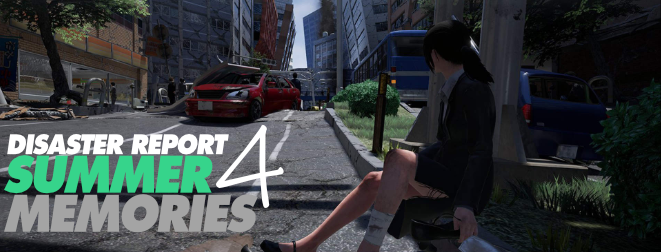Few games have left you confused as a new Granzella adventure, Disaster Report 4: Summer Memories, a natural disaster simulator with RPG elements. It must be said that, when we played it writing this review, we had never tried to feature in other series (the last one was released 11 years ago). So, after seeing the train drivers and reading some texts, we started playing with the idea that it would be a funny thing where we would save people who were the victims of the great earthquake. Technically, we are not wrong, but there is so much we can tell. And not because it is full of content, because meaning should also be given to this. Many are not always.
Disaster Report 4 begins by selecting the consultant and they will ask you what you would do if you were facing a life-threatening disaster for those around you. In response, you can choose from a number of options: I would do anything to help my loved ones, save as many people as possible, or I would save myself. So, you'll be able to choose between a male or a female character, their facial expressions, skin tone and head in their corresponding color (although we should warn you that the color will be completely different within the game because the global lighting won't be very good for hair). So far, everything is so simple and simple, in addition, it's always fun to have homemade options. So, after creating the character, they leave you on the bus where you can decide whether to let an elderly person sit down or insult him and sit down. These options have no side effects, but the game has a few RPG features of this type. You can choose to be the perfect love or motivation in every conversation, in any situation, and this is sometimes just as interesting. Talk to a store clerk to raise prices and make money quickly and suspiciously? Or talk to a girl who has been attacked and is crying? Well, of course, you can get a suspicious amount of money and praise him while beating or dating a victim because he is "your type" (that's what the game is about, not us).
So, after you have created your personality in some way (even though we emphasize that you are not obliged to respond in any particular way, it is simply establishing how you want to act in the game), a great earthquake is shaking the world with power. And by the great earthquake we mean one level "OMG, buildings are sinking to the ground, breaking in half and crushing everything in their path."
In summary, the game enables you to explore a series of "closed" levels in which you will deal with certain events from time to time and in order to keep moving forward in the story. They don't really tell you what to do until you find the right NPC and explain to you what your next job is. When we got caught trying to go somewhere, we, within half an hour, realized that we could get into things. So the game can be summarized in "talk to x, get x, talk to x", but various collections such as costumes and compasses have different structures, and side quests in some areas are slightly limiting to the game.
The story of the play is rare and the rhythm is crazy. You're in your place in the midst of an earthquake, trying to help a mother get her baby's water out of a chaos (which, to be fair, makes a lot of sense) and is suddenly the multi-millionaire leader of a program that tries to buy off random street trading shares. Also, the dialogue is really good, sometimes almost annoying.
That being said, the title has a charm that is hard to describe. If you've played Deadly Premonition, you'll understand what we mean when we say it's good. It doesn't look very good, the gameplay is incomplete and rare, but besides all that, we don't know exactly how, it ends up being addictive and you can't stop playing. That weird nature is amazing and you can't help but appreciate the strange twists and turns the game has taken.
However, the story of the Deadly Premonition is interchangeable, with good characters, a fun and entertaining escort and a great Twin Peaks-style mystery that players have to solve. Disaster Report 4 lacks these features, providing multiple addresses at once that, ultimately, it's hard to know what kind of game you're playing or what kind of game it is. In addition, it has some unique technical problems, such as dimming, lighting failures, bugs, text glosses and long loading screens, so all of this gives the impression that this is a game from the PS3 era. . In short, we can say that it has its flaws, but at the same time it is exciting and appealing.
So, if you want to spend 10 or 15 hours with a game that tells you nothing but give you a little of everything, see Granzella's article, Disaster Report 4: Summer Memories. An intriguing title, sometimes entertaining and fun (though the latter relies heavily on strange rhythms and brutal events that we never know are meant to be fun). In fact, we must admit that we had a great time playing it despite its flaws. However, if technical glitches bother you or less, you should look for an alternative, at least for a while, until they fix many of the problems the game has.
}) .done(function (code) { $('#re_loginbox').replaceWith(code); // console.log(code); $('.loginWrapper').show(); }) .fail(function(jqXHR, msg) { console.log("request fail"); $(selectorForLoginMessage).text(msg).show(); }); } return false; }
function FastRegisterResponse(){ $.ajax({ type: "POST", url: "/ajaxstuff/fastRegister.php",
}) .done(function (code) { $('#re_loginbox').replaceWith(code); // console.log(code); $('.loginWrapper').show(); }) .fail(function(jqXHR, msg) { console.log("request fail"); $(selectorForLoginMessage).text(msg).show(); }); return false; }
function LoginWithFacebook(selectorForLoginMessage, fbUpdateUser) {
FB.login(function(response) { if (response.authResponse) { FB.api('/me', {fields: 'email,last_name,name,first_name'}, function(user) { var main = false; if (user && !user.error) { // console.log(user); if(selectorForLoginMessage == '#fbLoginMessageMain') main = true; $.ajax({ type: "POST", url: "/ajaxstuff/fblogin.php", data: {userobj: user, fbUpdateUser: fbUpdateUser, main: main} }) .done(function(code) { if(main){ console.log("Is logged"+code); if(code==0) { if(!$('.signin').hasClass('active-signin')) { $('.signin').addClass('active-signin'); if($('.login').hasClass('active-login')) { $('.login').removeClass('active-login'); var request = new GRAsync(); var path = '/ajaxstuff/join.php?ajaxRequest'; request.setUrl(path) .setSelectors($('#joinContainer') ) .setData({register:true,facebookUser:user}) .setDataType('html') .setType('POST') .sendRequest();
} } } else { window.location="/";
} } else{ $('#re_loginbox').replaceWith(code); $('.loginWrapper').show(); //location.reload(true); } }) .fail(function(jqXHR, msg) { console.log("request fail"); $(selectorForLoginMessage).text(msg).show(); });
} }); } else { // console.log('User cancelled login or did not fully authorize.'); } }, {scope: 'email,publish_actions'}); // TODO: don't ask for publish_actions by default. It might scare away some users. Ask later, when they actually want it. return false; }
function AddSearchParamsAndReload(newParamStr) {
var newParamArr = newParamStr.split("&");
if (window.location.search.length > 1) { // don't count the initial '?'
var oldParams = window.location.search.substr(1).split("&");
var paramsToAdd = ();
for (var j = 0; j < newParamArr.length; j++) {
var found = false;
for (var i = 0; i < oldParams.length; i++)
if (newParamArr(j) == oldParams(i))
found = true;
if (!found)
paramsToAdd.push(newParamArr(j));
}
if (!paramsToAdd.length)
window.location.reload();
else
window.location.search += '&'+paramsToAdd.join("&");
}
else
window.location.search = '?'+newParamStr;
}












